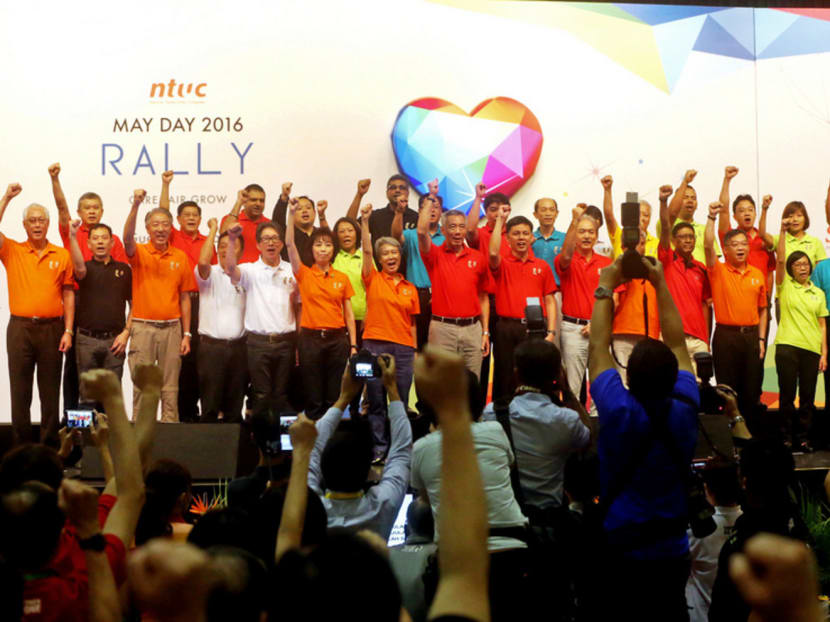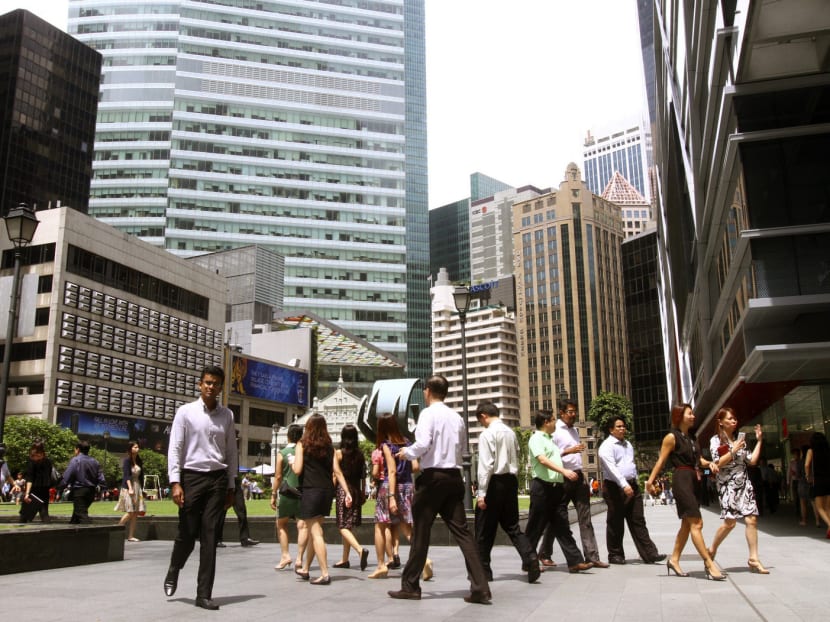PM urges collective, long-term view to ride out economic slowdown
SINGAPORE — In spite of the economic slowdown, Prime Minister Lee Hsien Loong yesterday urged policymakers, companies and workers to look beyond the year-to-year ups and downs and take a long-term view in forging a partnership to ride the global upheavals.


SINGAPORE — In spite of the economic slowdown, Prime Minister Lee Hsien Loong yesterday urged policymakers, companies and workers to look beyond the year-to-year ups and downs and take a long-term view in forging a partnership to ride the global upheavals.
To that end, while wage growth is expected to slow, Mr Lee said the National Wages Council’s (NWC) ongoing deliberations on its annual wage guidelines would take into account the overall outlook of Singapore’s economy, which is not all doom and gloom. “Overall there are dark areas, but there are also bright spots,” Mr Lee said at the May Day Rally held at D’Marquee in Downtown East.
Mr Lee noted that the global economic slowdown — with major economies including the United States, Europe and Japan struggling — has adversely affected local industries such as marine, oil and gas, electronics and port services. Port operator PSA’s Tanjong Pagar Terminal, for instance, has experienced days when two of its three shifts of workers did not receive a single ship, he said.
Retrenchment in some of these sectors has left some people struggling to get new jobs due to mismatch in skills and expectations, Mr Lee said. Of particular concern, he added, were mature workers — both the rank and file, and professionals, managers, executives and technicians (PMETs). Nevertheless, Singaporeans face less risk of getting retrenched than foreigners, he noted.
However, the outlook is relatively positive in other sectors, including information and communication technology, finance and insurance, as well as healthcare, which were still seeing new investments and jobs being created. While the Republic may face slower growth this year, it is likely to record positive growth, said Mr Lee.
In his speech, Mr Lee touched on the changes to industries, jobs and the workforce. Citing companies such as Alibaba, Uber and Airbnb, he pointed out that new business models are disrupting existing ones. Policymakers cannot stop this phenomenon nor should they try, Mr Lee said. What the Government will do is make sure that these businesses with new models compete on fair terms with existing companies. For example, rules are being reviewed to ensure a more level playing field for traditional taxi operators with the emergence of private-hire car apps Uber and Grab.
More fundamentally, the Government is helping industries and companies to compete better by supporting them as they transform, said Mr Lee, citing the S$4.5 billion industry transformation programme announced in this year’s Budget.
As Singapore transforms its economy, the jobs that are available will also change. This is why even while the economy is growing, retrenchments have gone up, Mr Lee said. However, unlike other countries facing a shortage of jobs, Singapore still has more jobs than job seekers, he pointed out.
Stressing the need to restructure industries and reshape jobs in order to offer workers opportunities to upgrade themselves, Mr Lee said: “Whether you are a company, a worker, or the Government, you have to take a long-term view of things. Not one year by one year, but look at it several years ahead in terms of long-term partnership.”
Employers and workers must approach the economic transformation with the “right spirit” by working together and being adaptable, he said.
Mr Lee added that the shape of Singapore’s workforce is also changing: By 2030, the proportion of PMETs will go up to two-thirds, compared to slightly more than half currently. To cater to this trend, the labour movement has adapted and reached out to PMETs, Mr Lee noted.
Last week, the Monetary Authority of Singapore’ twice-yearly Macroeconomic Review report showed that overall resident wage growth is expected to slow to about 2.5 to 3 per cent this year, from 3.5 per cent in 2015, as employment demand wanes and tightness in the labour market reduces.
Without naming the company, Mr Lee shared that a union leader had told him about a firm which had a bad year and the workers neither expected or pushed for a bonus. Yet, the company still gave a one-month bonus, to the employees’ pleasant surprise, he said.
Union leaders whom TODAY spoke to said wages for mature workers are likely to be suppressed, but getting a job will be the foremost concern for most. Mr Joseph Kwok, who heads the Financial Planning Association of Singapore, said most workers in his industry understand that they may not get good bonuses this year. “Their worry is more of whether they have a job, than wages,” he said.
Mr Effendy Mohd Shariff, President of the Chemical Industries Employees’ Union, added: “The pay cut, (mature workers) definitely have to take it because this is the reality. First, age is not on their side. Second thing is they don’t have the skill, so they need to get the right certificate to go for the industry.”
Mr Effendy had recently announced to workers that his company will be shutting down its manufacturing plant in a year. Almost 80 employees, ranging from rank and file to PMETs, will be affected, he said.
Companies interviewed were noncommittal on whether wage increases or bonuses are in store for their workers this year.
Nevertheless, Elsie’s Kitchen managing director Reuben Ang said his company is seeking to take advantage of the economic uncertainty by placing greater emphasis on training and upgrading of employees’ skills.
“Equipping them to undertake different duties will make us more versatile in responding to new market opportunities and service concepts amidst the flux,” said Mr Ang, 29.
The catering firm links part of each employee’s wages to the number and type of skills he or she is qualified to perform. “This model rewards skill enrichment of incumbent employees and incentivises skills upgrading,” said Mr Ang. ADDITIONAL REPORTING BY NG JING YNG






